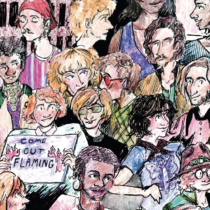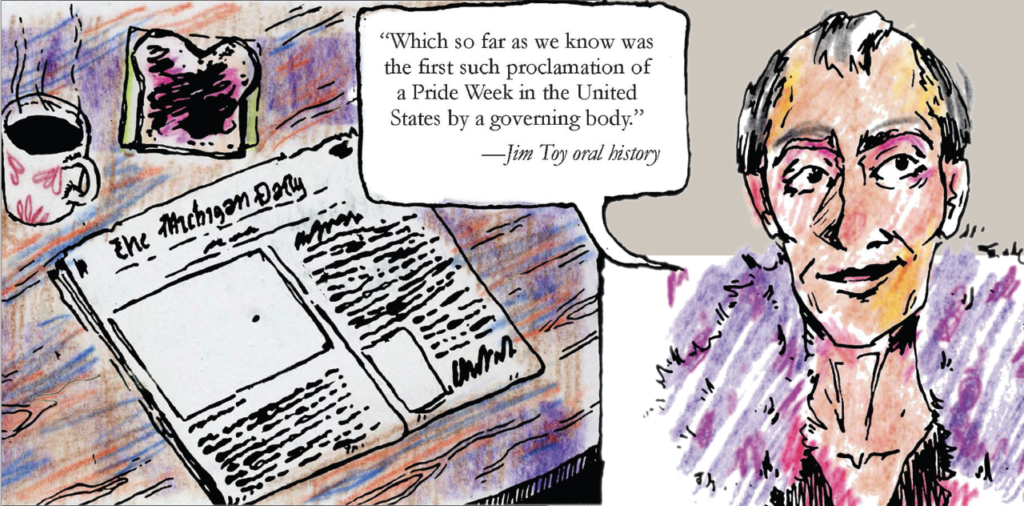Magazine

The Pride of Michigan
A historian and an artist team up to create a comic book celebrating Michigan’s first-ever Pride celebration. “It’s my job to bring to life people we wouldn’t know about otherwise,” the author says.
By Katie Vloet
Tim Retzloff saw a photo of a performer dressed up like a superstar—or a queen, if you will. He knew the singer’s persona but not his name. “I had to find my Aretha,” Retzloff says.
He pored through library collections, newspaper articles, and city directories. His relentless searching led him to an article that identified the drag queen in the photo, who had performed at the first gay pride parade in Detroit, as Mike Scott. Another article said he was a cook in Lansing restaurants. The common name made it challenging to locate the right Mike Scott, but Retzloff isn’t deterred by such obstacles. He eventually found the right person but learned Scott had died in 2010. He then tracked down Scott’s sister so he could interview her.
That’s the effort Retzloff put into identifying one person in one photo. Multiply that by several dozen, and you’ll get an idea of Retzloff’s persistence in telling the story of the 1972 Pride celebration in Detroit, the state’s first.
“This is a story that’s so important, you have to take the extra time. Do the extra digging. They were marginalized then and are marginalized now,” says Retzloff, who earned his doctorate at Yale. He is currently an adjunct assistant professor at Michigan State University and teaches LGBTQ studies and U.S. history. “It is my job to bring to life people we wouldn’t know about otherwise.”
Retzloff has done exactly that with a new book called Come Out! In Detroit: The Story of Christopher Street Detroit ’72. The 28-page, full-color comic is the result of decades of research, including the collection of oral histories from dozens of the 300 or so people who attended the pride parade. His interviews were supplemented with documents he found in several archives and libraries, including the Bentley.
Initially, he envisioned a short comic that would be timed to celebrate the event’s 50th anniversary. Retzloff reached out to family friend Isabel Clare Paul, an Ypsilanti artist and graduate of the Center for Creative Studies in Detroit, in 2020 to talk about a short comic that could run in Between the Lines, the Detroit-area’s LGBTQ+ newspaper.
Paul couldn’t wait to get started. “I graduated in a pandemic, so there weren’t a lot of opportunities,” she recalls. “This was a perfect, immaculate thing that appeared out of nowhere.”
She learned about the march as she prepared to create images. For queer people in Detroit, Paul says, the march “was a big deal because not a lot of people had come out. They went down Woodward and took up a whole lane of traffic,” says Paul, referencing one Detroit’s main streets. “They got in people’s faces. I thought that was really powerful, and so brave.”
The powerful and brave stories needed more than a few pages, the team decided. And Retzloff no longer wanted the comic to be published in something as ephemeral as a newspaper. It needed to be its own comic book. Both creators wanted to make the story available at no charge.
Recording History
Some of the most important moments in Retzloff’s research occurred long before he had even conceived of the comic. When he was an undergraduate history student at U-M in the early 2000s, he would use his income tax refund to pay for trips centered on collecting oral histories from notable LGBTQ+ people. Along the way, he learned of Greg Kamm, a founder of the first known gay organization in Kalamazoo and an officer with the earliest LGBTQ+ organization at Michigan State University in the early 1970s.
In 2004, Retzloff reached out to Kamm, at an address in northern Michigan. More than a year later, he finally heard back. The problem, Retzloff recalls, was that Kamm was only going to be in the country for a few weeks before returning to Saudi Arabia, where he taught English. Retzloff dropped everything, hopped in the car, and set out to record an interview with Kamm.

An illustration of Jim Toy by Isabel Clare Paul.
“He brought out these photo albums, and there were people marching down Woodward,” Retzloff says. “I’d never seen them. They were extraordinary. A year later, I went back and scanned all these photos.”
That’s also when he learned that Kamm had kept detailed diaries around the time of the march. He was reluctant to show them to Retzloff, who offered a suggestion: “I said, ‘How about if you read an entry to me, and I can ask you questions about it?’ He did, and one of his first entries was this detailed description of the day of the march.” The words from Kamm’s diaries appear throughout the new book.
Another prominent figure in the book is Jim Toy, the co-founder of what was then called the Human Sexuality Office at U-M. It was the first campus office in the U.S. that aimed to serve LGBTQ+ students. Toy, a longtime activist based in Ann Arbor, was one of one of five speakers at the rally.
“I know that gay stands for love, and that gay stands for life,” Toy said on that day in 1972. “Maybe that’s all I know, but that is all I need to know, and that is all you need to know. So, I ask you to come out—come out for love, come out for life.”
Retzloff showed Toy the drawing that Paul made of him before the book was published. “He’s wearing a purple boa. He loved it,” Retzloff says. Toy died earlier this year.
The comic ends with a panel quoting Kamm’s diary: “I feel I helped the cause, that the entire rally was a beautiful statement of homosexuals no longer hiding & taking the dirt of society. I feel that I & the entire group did something of great significance.
“Indeed, everyone there Came Out.”
Come Out! In Detroit has been funded in part by a Michigan Humanities Grant. Some 20,000 copies of the book were distributed at Free Comic Book Day in May 2022, as well as Pride events, community centers, libraries, and bookstores. Retzloff’s collection of oral histories has been donated to the Bentley Historical Library; most of the collection is closed to research until later in 2022, with some portions becoming available in 2028.
